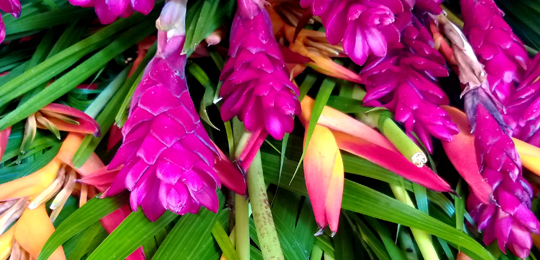October 2019
Why is it not on the Agenda?

The second Pacific Week of Agriculture was hosted in Samoa
In Fiji alone the floriculture industry is worth $1.6million, so why is the industry’s future not on the agenda at the Pacific Week of Agriculture (PWA)?
Samoan flower grower, Leaupepe Lasa Aiono says governments need to pull their weight.
“We’ve had a flower association since 1994 and we have close to 50 floriculturists here in Samoa but we don’t know which ministry we are under.”
“Is it MAF? Visitors Bureau? Nothing on flowers and I always say, hey how about flowers?’’ she said.
Leaupepe Lasa Aiono started planting flowers 30 years ago as a hobby.
“I don’t want to disclose the figures made from flowers but let me tell you, it’s enough to put the food on the table, pay for holidays and give your kids a good life and education.”
“Some of the women that started off with us at the association are today the owners of restaurants and real estates,” she said.
“In Samoa we like to see nice things and so everybody buys flowers.”
“The minister should have a flowers and pot plants, the CEO should have a flower arrangement, visit any of these offices and it’s really good for us here because you don’t have to beg for them to buy it, they want it!”
“It’s a shame that flower is not a commodity in Samoa because the future will be exports and already we know that bio security issues will hold us back, it’s a problem government needs to resolve.
The floriculture industry didn’t make it to the main discussion stage at PWA.
It was relegated to a Side Event,Women in Agriculture: Flowers, Food and Art presented by Pacific Island Farmers Organisation Network (PIFON) and the Pacific Agribusiness Research in Development Initiative (PARDI 2).
Samoa’s Minister for Agriculture Afioga Lopaoo Natanielu Mua told women flower growers that “women and empowerment in the Pacific always makes good policy given the leading role they have in all aspects of agricultural production and marketing.”
‘’Empowerment of farmers today, is best achieved when they are able to conduct their farm operations in an environment that is conducive and supportive of farming as business,’’ he said.
Industry leaders want flowers to be classified a commodity crop, as it would attract much needed research and marketing funding.
“Flowers can easily contribute at a larger scale particularly with exports around the Pacific,” said PIFON’s Anare Lewenavanua
“At our recent Farmers Having Their Say Workshop for Fiji Farmers in Nadi, we had farmers earning $300 on average per week which is more than what some of those sitting in offices earn in a year.”
“Our leaders need to seriously consider the benefits and opportunities of floriculture, to take it forward as well as look at policies and procedures that are currently in place, or not, to truly make it work.”
Leaupepe Lasa Aiono dreams of exporting flowersbut that’s unlikely until this female dominated industry is taken seriously.
“If flowers became a commodity it would be great to have somebody to come in for the Pacific and bring us together, we will be stronger and perhaps PIFON needs to do this.”
